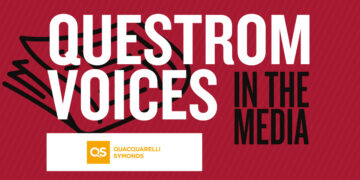From Watchdog to Cheerleader: The Bezos Washington Post’s New Corporate Mission
“We are going to be writing every day in support and defense of two pillars: personal liberties and free markets… We’ll cover other topics too of course, but viewpoints opposing those pillars will be left to be published by others.” Jeff Bezos 26-Feb-2025
What??
This isn’t about journalism—it’s about corporate power cloaked in ideology.
“Personal liberties and free markets” is code for minimal government intervention and corporations dodging responsibility of social and moral issues but rather leaving it to individuals. These are the teachings of Milton Friedman and Frederich Hayek, the intellectual foundation of today’s libertarianism. Although often quoted out of context, Adam Smith’s Wealth of Nations has many of these notions. But in context, and conveniently ignored or even rejected by libertarians, Smith wrote and included the Theory of Moral Sentiments, and he makes clear that capitalism must be constrained by ethics, fair trade, and protections against greed, fraud, and monopolies. Where Smith recognized needed support to reduce poverty and support the environment and ensure fair competition, Bezos and the libertarian view is to enable the dominance of the largest of corporations, support their missions with subsidies and tax breaks, and reduce or eliminate regulation. A socialism for corporations.
Why not let the reader do the work?
Bezos’s approach—where “opposing viewpoints will be left to others”—is adodge, not a principle. Independent journalism is supposed to challenge power, not outsource the job to competing outlets. This model mimics the internet and echo-chambers. It moves the responsibility to the individual to sift through bias and misinformation on their own. Haven’t we always depended on trusted news outlets to do that for us in a balanced and unbiased way? Are we equipped to resist the influence of the loudest and most well-funded sources? We all know that even centrist reporting has a little bend to the right or left, but it is in a range. A total ideological takeover tilts the playing field entirely. Thatis detrimental to critical thought.
I love reading a few news sources.
The non-pretense Wall Street Journal is named and unabashedly a defender of business and capitalism with its opinions mainly reflecting the free market and libertarian bent. Although I disagree with many of the opinion page pieces, I like to understand their views and relish the huge benefit of the news section’s excellent, largely unbiased news reporting. Notably, over time, The Journal has expanded beyond financial news to cover politics and global affairs. The Washington Post, meanwhile, brands itself with “Democracy Dies in Darkness”, positioning itself as a guardian of democracy, public discourse, and political analysis. The Post, The New York Times, and other reputable publications have long taken pride in challenging political leaders, exposing corruption, and ensuring multiple viewpoints are heard, analyzed, and presented to the public.
But Bezos is turning The Post into yet another media empire where corporate interests dictate the narrative, a megaphone, if you will, for administrations that have tilted toward corporate influence — reducing guardrails, removing restrictions on monopolies, and ensuring nothing stands in the way of profit-first principles. This follows a wider global trend, where billionaires—from Rupert Murdoch in the UK and Australia to Elon Musk at X (formerly Twitter)—are consolidating control over major news outlets, shaping public discourse to serve their own financial and political interests.
Isn’t this just a not-so-veiled attempt to gain favor from Trump and Musk, who are holding the reins? Bezos is rightfully scared of their power to curtail any growth of Blue Origin and Amazon Web Services, so he is rejecting his moral stances of years past and cowering to their successful bullying tactics.
But where does that leave the paper? Without taking anything away from their excellent news and investigative reporters, Bezos has made it clear that he retains editorial control, and one who is not afraid to kill or neuter stories that would be critical of the current administration. So, if I want to be sure to get all the news without overreach of a self-interested billionaire, then why bother with the Post? Quality reporting can be had without interference – from the New York Times and the Wall Street Journal news along with several other news sources.
So long, WaPo
With a heavy heart, I cancelled the subscription to the Post. Bezos has completed his takeover of the newspaper to reflect what he perceives as his best foot forward to appease the current political reality – that of the corporations’ government.
Maybe Bezos thinks this will attract a new audience. Unlikely, for there are plenty of right-wing outlets to choose from. But the bigger issue is that this model—where billionaire-backed media aligns itself with corporate power—undermines democracy on a global scale.
From The U.S. to the U.K. to Australia, independent journalism is being reshaped not to hold power accountable, but to protect it. If major newspapers stop challenging corporate and political elites, who will?
Worrisome Trend
This isn’t just about one billionaire’s self-interest. It’s about the corporate takeover of public discourse—where journalism is no longer a check on power, but an arm of it.
Independent media must remain independent. Otherwise, we aren’t just losing a newspaper. We’re losing the very thing The Post once stood for: journalism that holds the powerful accountable



























